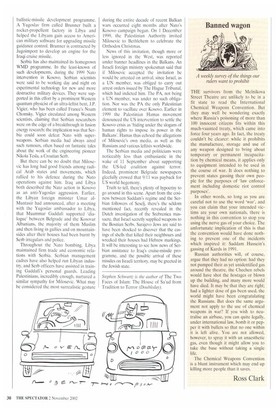Banned wagon
A weekly survey of the things our rulers want to prohibit
THE survivors from the Melnikova Street Theatre are unlikely to be in a fit state to read the International Chemical Weapons Convention. But they may well be wondering exactly where Russia's poisoning of more than 100 innocent citizens fits within this much-vaunted treaty, which came into force four years ago. In fact, the treaty couldn't be clearer: while it prohibits the manufacture, storage and use of any weapon designed to bring about temporary or permanent incapacitation by chemical means, it applies only to equipment intended to be used in the course of war. It does nothing to prevent states gassing their own people for the purposes of 'law enforcement including domestic riot control purposes'.
In other words, so long as you are careful not to use the word 'war', and you can claim that your intended victims are your own nationals, there is nothing in this convention to stop you using the nerve gas of your choice. The unfortunate implication of this is that the convention would have done nothing to prevent one of the incidents which inspired it: Saddam Hussein's gassing of Kurds in 1991.
Russian authorities will, of course, argue that they had no option: had they not pumped their as yet unidentified gas around the theatre, the Chechen rebels would have shot the hostages or blown up the building, and many more would have died. It may be that they are right; had a lighter dose of gas been used, the world might have been congratulating the Russians. But does the same argument not apply to the use of chemical weapons in war? If you wish to neutralise an airbase, you can quite legally, under international law, bomb it or pepper it with bullets so that no one within it is left alive. You are not allowed, however, to spray it with an anaesthetic gas, even though it might allow you to take the base without taking a single life,
The Chemical Weapons Convention is a blunt instrument which may end up killing more people than it saves.
Ross Clark


































































































 Previous page
Previous page